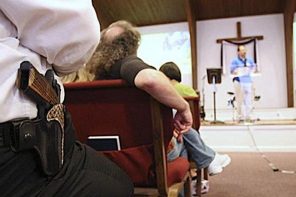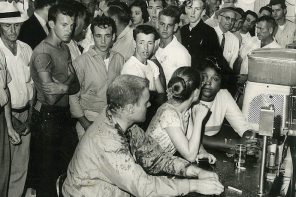Today’s politics are filled with invocations of previous presidents and previous eras. One such invocation connects Obama with Abraham Lincoln. His political rise in Illinois—and the centrality of Lincoln’s iconography in America’s historic and contemporary racial politics—makes this unsurprising. Nor is it new to equate presidents that promise hope with Lincoln—we did it with JFK (another president in whom many invested hope as we elected our first, and only, Catholic president).
Yes, as we recognize the 200th year of his birth, this is a year filled with Lincoln celebrations. Obama has, of course, been self-conscious in his construction of such parallels: from his announcement of candidacy on the steps of the Illinois State House to the title of his inaugural address; from his much-anticipated use of the Bible Lincoln was sworn in on and his very own whistle-stop train trip to Washington; to his emphasis on including those with whom he ostensibly disagrees in his leadership team and his inauguration.
Likewise, invocations of Martin Luther King are rife. And this is not merely about the timing of the inauguration so close to the national holiday remembering King. Racial politics and the hope of transformation of American racism undergird this equation as well. Remember, Obama’s “Yes We Can” echoes Cesar Chavez’ “Si, Se Puede!” and his outreach model parallels that of the United Farm Workers.
Swirling comparisons between today’s economic crisis and the Great Depression add a soupçon of FDR to Obama’s aura as well. (For a piece on the many ways that Obama has been compared to other presidents, read “Coming soon…Obama as Millard Fillmore.”) And, like his predecessors, Obama draws on the iconography of American history by citing our founding texts as well; in Baltimore, for example, Obama said:
What is required is a new declaration of independence, not just in our nation, but in our own lives—from ideology and small thinking, prejudice and bigotry — an appeal not to our easy instincts but to our better angels. (As reported here.)
Such equations of present and past are what make up American civil religion, functioning to consolidate the past and situate novel permutations within a meaningful tradition. They are, as Robert Bellah said so many years ago in The Broken Covenant part of “that religious dimension, found I think in the life of every people, through which it interprets its historical experience in the light of transcendent reality.”
Bellah continues by using the word “myth”; as he puts it:
Myth does not describe reality; that is the job of science. Myth seeks to transfigure reality so that it provides moral and spiritual meaning to individuals or societies. Myths, like scientific theories, may be true or false, but the test of truth or falsehood is different.
In his invocations of the past—and the many such evocative comparisons across the media, Obama joins others who use founding texts or identification with American hagiography to shove us from the sad realities of today toward ideals to which we aspire. Like the women of Seneca Falls whose addition of “and women” transformed the Declaration of Independence to the Declaration of Sentiments, Obama (and others) seek to use our history to express hope. In doing so, they re-authorize civil religion.
Read as the language of myth, invocations of Obama as Lincoln, as MLK, as FDR, even as Millard Fillmore are double-edged; the American covenant, which we treasure so, was, as Bellah made clear, broken from the get-go. Rendered obvious by the juxtaposition of the Declaration of Independence’s statement that “all men are created equal” with our Constitutional acceptance of chattel slavery, and embedded as well in contradictions of such equality with policies regarding Native Americans and women, the paradox of high ideals and historic failures is a defining characteristic of our nation.
Just read the Emma Lazarus quotation gracing the Statue of Liberty alongside the Asian Exclusion Act or contemporary immigration policies. Or remember that on November 4, 2008, as Obama was elected, Arkansas banned adoption by individuals cohabiting outside of marriage—what many deemed a poorly-disguised effort to criminalize lesbian and gay adoptions—the measure passed with 57% supporting and 43% opposing. That same day also saw passage of California’s Proposition 8, yet another “defense” of heterosexual marriage.
Remembering these very paradoxes (and many others) is critical to ensuring that hope is more than foolish naivete. We must remember too that our failures are not merely historical sediment but the actual profound brokenness of contemporary life.
So today, on the occasion of this historic inauguration, a few complications are in order. A few questions. These too may draw on historic parallels. Already, some have questioned Obama’s inclusion of Rick Warren in the inaugural events and aspects of his domestic and foreign policy positions, drawing on Frederick Douglass’ disappointment with Lincoln during the 1861 inauguration.
Some have cited Obama’s own defense of Lincoln in their critique:
Lincoln had intended to use his first inaugural address to challenge the rebel Southern states with the words: “Shall it be Peace or a Sword?” But he abandoned such bellicosity, saying that he had neither power nor inclination to abolish slavery. Instead, he ended his speech with an appeal to the “mystic chords of memory” to unite the country.
It did not work. Abolitionists such as Frederick Douglass accused him of betrayal and civil war began anyway. In his book, The Audacity of Hope, Mr. Obama defends Lincoln, saying that the attempted bargains with the South were “never a matter of abandoning conviction for expediency” but a recognition of the “terrible price” to be paid for pursuing “absolute truths.”
As Obama connects himself to Lincoln, we wonder what the results of his bargaining with the Christian Right portends. In making such connections, commentators have not only lambasted (and sought to rescue) Obama, but have reminded us of the complications of history. They returned Lincoln to his humanity.
So too would asking whether Obama is aware of controversies about Lincoln being gay—a whole different set of material neither invoked by Obama (as far as I know) nor by those critiquing him. (On this topic, see C.A. Tripp, The Intimate Lincoln or various media discussions of this including the NY Times Book Review or in the Boston Globe.)
Is Obama’s invocation of Lincoln meant to raise questions about sexuality? Of course not. And yet, we might ask: what does the rendering invisible of that particular Lincoln tell us about the Obama who has included evangelical pastor Rick Warren—and belatedly New Hampshire Episcopal bishop Gene Robinson—in his inauguration?
Nor have we inquired about the risks of equating Obama with historic figures associated not merely with civil rights but with violence. Does the invocation of Lincoln-as-Martyr contribute to social control, rendering dissent more difficult for some of us, or evoking, for others, an implicit threat? No, we are not heading (we hope) to civil war. But we are at war; is there any chance that invoking Lincoln inadvertently legitimizes that war? Or, that ignoring Martin Luther King’s opposition to the Vietnam War does so as well?
In reflecting on these questions we must ask at least one more. Who remains outside the sphere of invocation? And, what does it mean that these invocations are of men, and of white and black men, for the most part? Of (at least ostensibly) straight men? Is it symptomatic of our race and gender politics that we have failed to invoke Sojourner Truth or Barbara Jordan? Eleanor Roosevelt or Harvey Milk? Is it symptomatic of our parochialism that global figures such as Desmond Tutu (who, by the way, has called homophobia a new apartheid) remain unmentioned while Rick Warren has center stage?
I am not alone in raising such questions. In responding to Obama’s candidacy, young Muslims expressed mixed emotions about Obama’s ways of managing the persistent (false) rumor that he is Muslim. And they celebrated Colin Powell’s words:
Well, the correct answer is he is not a Muslim, he’s a Christian. He’s always been a Christian. But the really right answer is, what if he is? Is there something wrong with being a Muslim in this country?
Those young Muslims supported Obama’s candidacy, but wished for more. Somewhat analogously, I want to ask: so what if some of us are hesitant, ask questions, worry about homophobia and Rick Warren? Is there something wrong with calling for more in this country? Even on the eve of an inauguration?
To return to Robert Bellah:
In a period like our own, when we have lost our sense of direction, when we do not know where our goal is, when our myths have lost their meaning and comprehensive reason has been eclipsed by calculating technical reason, there is need for a rebirth of imaginative vision. In the face of such a situation imagination can sometimes fuse myth and ecstatic reason to render a new vision, a new sense of direction and goal. Such a new vision is never unrelated to older visions—that is why tradition is so important; but neither is it identical with them—that is why ecstatic reason must also be involved.
So, I am a celebrating, ambivalent American on the eve of this inauguration, and I ask ecstatically: Where is gay Abe? Where are Harvey Milk, Eleanor Roosevelt, Sojourner Truth, and all those other ghosts of our broken covenant? Whose hope is it, Mr. President?



